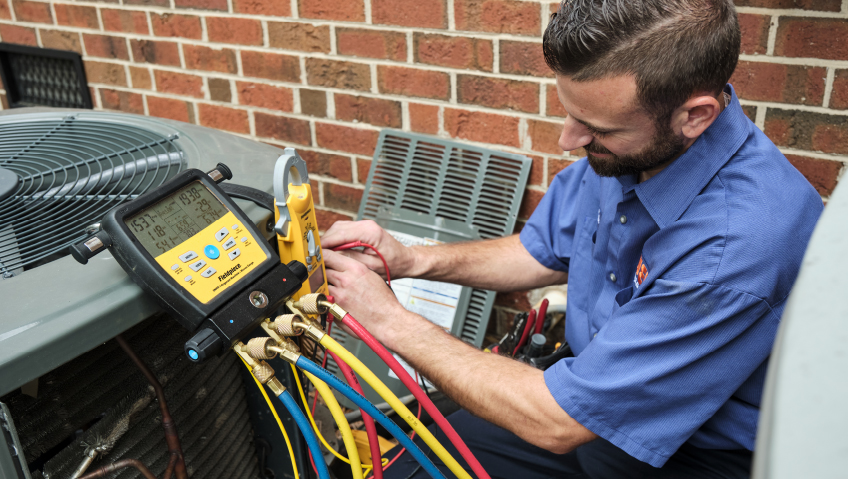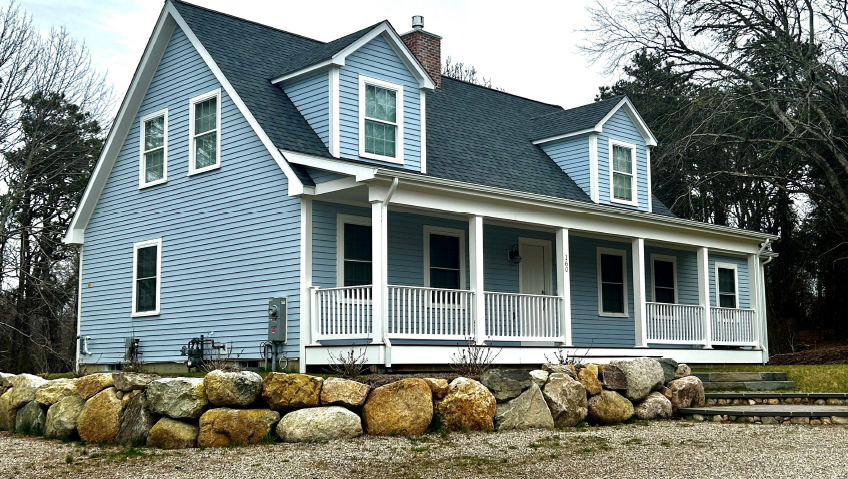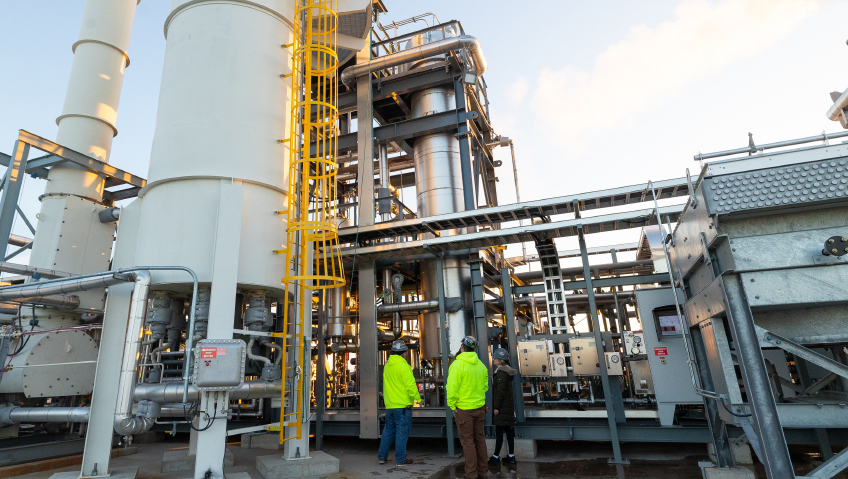Since its founding in 2016, TurnPoint Services has skyrocketed to success, growing from $30 million in annual sales in a single market to annual sales of over $1.4 billion and an active presence in 34 states.
The company’s brands provide heating, ventilation, air conditioning (HVAC), plumbing, electrical and standby-generator repair and replacement services to residential and commercial customers. In addition, TurnPoint boasts a rapidly growing division that provides plumbing and HVAC construction services for the multifamily and residential sectors.
After highlighting the company in March 2023, Construction in Focus checked back in this month to learn the latest news. “We continue to experience successful growth in spite of massive industry headwinds,” says Chief Strategy Officer Curtis Bragg. “Rising interest rates, inflation, housing market trends, and other challenges in 2023 impacted the industry. Manufacturers’ shipments of HVAC units and water heaters have fallen after achieving unprecedented highs in 2021 and 2022. Some call 2023 a reset year; I saw it as a transitional year—transition from outsized industry-wide growth in 2021 and 2022 to return to more conventional consumer demand in 2023 and beyond.”
Foundational aspects of the industry remain steady. “The role HVAC systems play in providing comfort, improving indoor air quality, and enhancing energy efficiency in homes hasn’t changed,” Bragg says. “Energy efficiency and convenience extending into the plumbing and electrical service markets as consumers embrace tankless water heaters and standby generators also remains attractive.”
As is to be expected, COVID has had a major impact on the industry. “We all recognize the COVID pandemic had far-reaching effects on various sectors of the economy, including the HVAC, plumbing, and electrical industry,” Bragg says. “The pandemic disrupted global supply chains, leading to delays in the production and delivery of replacement equipment; created shortages of key components and materials, impacting equipment and replacement parts availability; and manufacturers faced challenges in sourcing raw materials and maintaining production levels, affecting the supply of HVAC units to meet the demand.”
But the shutdown also had an unexpected, positive effect on the industry. “It was quite a different story on the consumer demand side as working from home became the norm for so many who were suddenly spending unprecedented time indoors,” says Bragg. “So, for the homeowner who was away at work each day during peak cooling demand, it was an eye opener to find out their HVAC unit wasn’t keeping up with the heat rise caused by the afternoon sun or that their water heater couldn’t recover fast enough to meet the hot water needs of more people in the home during the day. Some studies suggest consumers decided to invest to improve their homes when faced with the realization that the home was now going to be their working environment too. And since COVID interrupted daily life as it had been, investing in the home with funds which, in any other time, would have been spent on eating out or on vacations, made a lot of sense.”
Worries over contracting COVID pumped the brakes on some home improvement projects, however. “The flip side of the demand curve from the consumers’ perspective was concern about inviting contractors into their homes during the pandemic, contributing to hesitancy among homeowners to undertake HVAC replacements unless they felt they had no choice,” Bragg says.
Demand from the commercial sector was also affected by the shutdown. “COVID impacted the commercial markets too as restaurants emphasized delivery and curbside pick-up or office space sat mostly empty, which resulted in decreased ‘facility’ related demand.”
The industry continues to adjust to the major shifts caused by the pandemic. In order to stay ahead, TurnPoint has had to remain nimble, pivoting in response to evolving demands. “The post-COVID landscape is quite different as consumer behavior changed, fueled by economic uncertainties and financial constraints,” Bragg says. “Homeowners prioritized discretionary spending and shifted toward maintenance and repair versus replacement. Our brands adapted by offering more preventive maintenance and repair solutions to meet the needs of homeowners looking to extend the lifespan of their existing systems.”
A number of these adaptations that COVID forced have proven beneficial. “Some of the innovation that came out of the COVID period has been positive for the industry,” Bragg says. “For example, to adapt to social distancing guidelines and minimize in-person interactions, we increasingly adopted remote technologies for consultations, diagnostics, and estimates. Virtual assessments and consultations enabled us to provide services while adhering to safety protocols and minimizing physical contact with homeowners. The use of technology such as video calls and digital tools improved efficiency and communication to the extent that some practices remain in use in a post-COVID world.”
The team has made the most of a challenging situation, harnessing an opportunity to expand during the aftermath of the pandemic. “For TurnPoint, the post-COVID transition provided an ideal time to get hyper-focused on self-evaluation,” Bragg says. “Growing so fast as we went from 11 brands to 60 brands, we knew some of the infrastructure we built to get to $1 billion in annual sales could benefit by being refreshed for us to again double in size. So, while continuing to serve the market, we streamlined many of our business practices, developed a comprehensive digital roadmap and revised strategic plan, and stood up new scalable capabilities we believe are essential to accelerating our performance and maintaining our industry position.”
Industry-wide challenges continue to affect the post-COVID landscape. These include “the digital-marketing environment and the never-ending competition for, and availability of, technical talent,” Bragg explains. “At TurnPoint, we genuinely consider challenges to be opportunities and therefore we commit to being in a sustained state of continuous improvement and anticipating what’s to come.”
The company’s marketing division is a particularly impressive example of this commitment. “We have built the largest in-house marketing agency in the industry,” Bragg says. “That team is staffed with visionaries and functional expertise to keep us in a leadership position while our People Team makes sure we not only get the talent we need to grow but we can also grow the talent once it gets here. I can’t say enough about what a magnificently talented group of professionals we have assembled across our marketing and people teams.”
Several key elements impacting the industry today are expected to remain relevant for the foreseeable future. “There continues to be an increased demand for energy-efficient systems, technological advancements in HVAC equipment such as smart thermostats and energy-efficient heat pumps, growing awareness of indoor air quality and health concerns, and government initiatives and regulations,” says Bragg. “The economy is driving price sensitivity among consumers while new weather patterns are translating to even more seasonal fluctuations in demand.”
As always, the team remains committed to partnering with only the best brands. “We’ve been purposeful and disciplined in selecting which companies join TurnPoint by prioritizing company culture, reputation, and future growth potential. We are quite proud of the brands and the general managers who lead the brands for the focus they maintain to serve their communities and their people.”
To best support the company’s brands, the team built the proprietary technology platform TurnPoint.Logic℠. The machine learning tool forecasts consumer demand and improves job and labor planning. When first developed, the team recognized “a real game changer,” Bragg says. “We’re now moving past a very successful pilot stage of TurnPoint.Logic℠, realizing just how powerful of a tool this will be for our brands. I’m really excited about how TurnPoint.Logic℠ will contribute to our future success and growth as an influential element of our digital roadmap.”
The team’s commitment to excellence extends to customer service. “TurnPoint will continue to adhere to core foundational factors necessary to be a great service organization. This includes having a customer-centric mindset throughout to understand customer needs and wants, consistently delivering high-quality services and value every day, everywhere, and having skilled and motivated people. Beyond that, we know the service industry is a ‘what-have-you-done-for-me-lately’ industry, so we will continue to innovate and improve our operations to build on an already strong brand image and reputation.”
These company values have remained strong throughout the company’s remarkable growth, and the team is determined to maintain them as TurnPoint keeps expanding. “In terms of future goals, we haven’t wavered from what we originally set out to do: build the kind of company we’d want to work for as an employee,” Bragg says. “Our leadership team remains dedicated to focusing on creating value for our team members, customers, and shareholders, with the payoff being a differentiated place in the industry. The future is bright for TurnPoint.”






